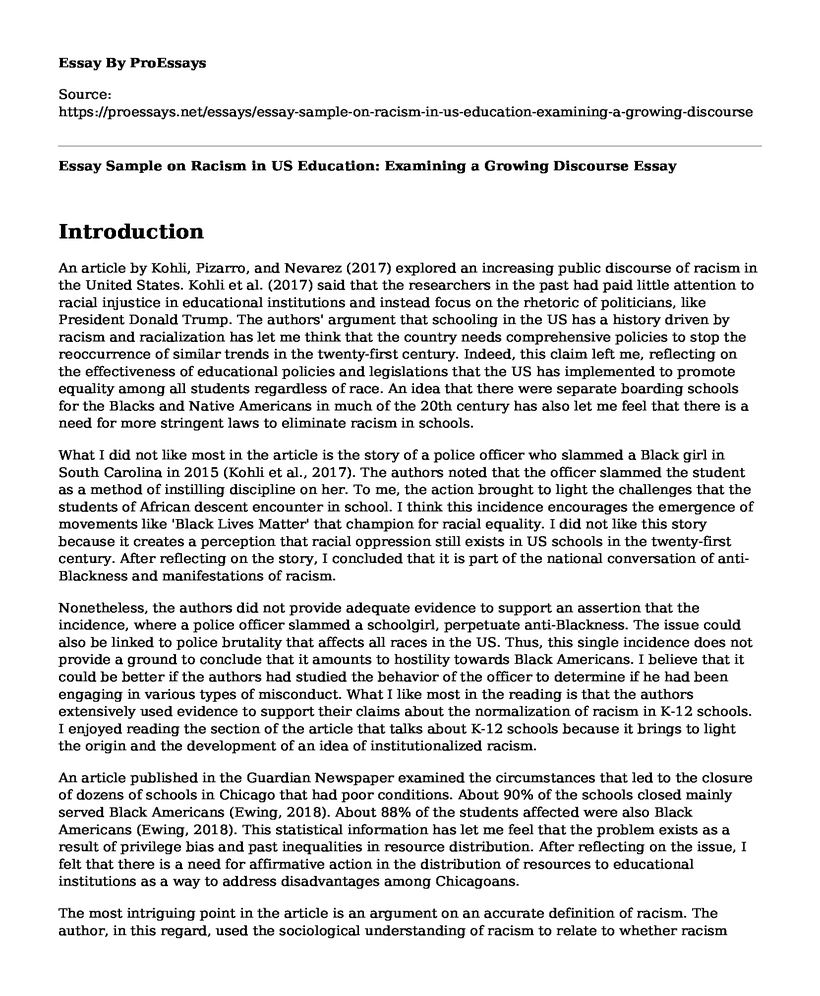Introduction
An article by Kohli, Pizarro, and Nevarez (2017) explored an increasing public discourse of racism in the United States. Kohli et al. (2017) said that the researchers in the past had paid little attention to racial injustice in educational institutions and instead focus on the rhetoric of politicians, like President Donald Trump. The authors' argument that schooling in the US has a history driven by racism and racialization has let me think that the country needs comprehensive policies to stop the reoccurrence of similar trends in the twenty-first century. Indeed, this claim left me, reflecting on the effectiveness of educational policies and legislations that the US has implemented to promote equality among all students regardless of race. An idea that there were separate boarding schools for the Blacks and Native Americans in much of the 20th century has also let me feel that there is a need for more stringent laws to eliminate racism in schools.
What I did not like most in the article is the story of a police officer who slammed a Black girl in South Carolina in 2015 (Kohli et al., 2017). The authors noted that the officer slammed the student as a method of instilling discipline on her. To me, the action brought to light the challenges that the students of African descent encounter in school. I think this incidence encourages the emergence of movements like 'Black Lives Matter' that champion for racial equality. I did not like this story because it creates a perception that racial oppression still exists in US schools in the twenty-first century. After reflecting on the story, I concluded that it is part of the national conversation of anti-Blackness and manifestations of racism.
Nonetheless, the authors did not provide adequate evidence to support an assertion that the incidence, where a police officer slammed a schoolgirl, perpetuate anti-Blackness. The issue could also be linked to police brutality that affects all races in the US. Thus, this single incidence does not provide a ground to conclude that it amounts to hostility towards Black Americans. I believe that it could be better if the authors had studied the behavior of the officer to determine if he had been engaging in various types of misconduct. What I like most in the reading is that the authors extensively used evidence to support their claims about the normalization of racism in K-12 schools. I enjoyed reading the section of the article that talks about K-12 schools because it brings to light the origin and the development of an idea of institutionalized racism.
An article published in the Guardian Newspaper examined the circumstances that led to the closure of dozens of schools in Chicago that had poor conditions. About 90% of the schools closed mainly served Black Americans (Ewing, 2018). About 88% of the students affected were also Black Americans (Ewing, 2018). This statistical information has let me feel that the problem exists as a result of privilege bias and past inequalities in resource distribution. After reflecting on the issue, I felt that there is a need for affirmative action in the distribution of resources to educational institutions as a way to address disadvantages among Chicagoans.
The most intriguing point in the article is an argument on an accurate definition of racism. The author, in this regard, used the sociological understanding of racism to relate to whether racism played a role in the closure of schools in Chicago or not. To sociologists, racism lives in systems than define how society operates rather than on individuals. I like this concept because it explains the pervasiveness of poverty in American schools. More specifically, it alludes that racism is the root cause of problems that exist in Chicago schools. However, I did like a claim that Chicagoans should not have protested against the closure of schools because they were in terrible conditions. I think they had a right to protest because the problem has its roots in historical policies that perpetuated inequality in the United States.
References
Ewing, E. (2018, December 7). What led Chicago to shutter dozens of majority-black schools? Racism. Retrieved December 15, 2019, from https://www.theguardian.com/us-news/2018/dec/06/chicago-public-schools-closures-racism-ghosts-in-the-schoolyard-extract/url/
Kohli, R., Pizarro, M., & Nevarez, A. (2017). The "New Racism" of K-12 Schools: Centering Critical Research on Racism. Review of Research in Education, 41(1), 182-202. doi: 10.3102/0091732x16686949
Cite this page
Essay Sample on Racism in US Education: Examining a Growing Discourse. (2023, Mar 16). Retrieved from https://proessays.net/essays/essay-sample-on-racism-in-us-education-examining-a-growing-discourse
If you are the original author of this essay and no longer wish to have it published on the ProEssays website, please click below to request its removal:
- Family Separation at the Border Case Study With Letter Example
- Essay Sample on Women and Race
- Women History Month Activities - Essay Sample
- Annotated Bibliography on Child Abuse: Long-Term Health Consequences
- Amphetamines: Stimulants, Street Names, and Forms - Essay Sample
- Essay Example on 9/11 Attacks: A World at a Standstill
- Chimamanda Adichie's Journey from Nigeria to America: Education, Privilege, and Experience - Essay Sample







